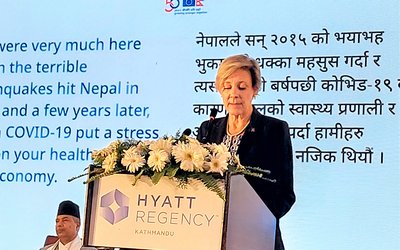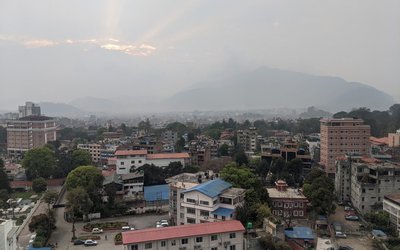Months have passed since the Corona outbreak in China, which has now taken a pandemic shape, taking numerous human lives and inflicting serious injuries on the global economy. Alarmed by the spread of the virus, many countries hurriedly announced lockdown, bringing national economies to a grinding halt. This complete stoppage did not produce intended results in terms of significantly reducing the virus spread and it was realized over time that it would simply be not possible to continue with this kind of halt- a breeder of hunger, starvation and poverty. Decision-makers across nations were, therefore, left with no choice but to gradually ease restrictions. With the opening of workplaces\markets, some economic activities have commenced and Covid-19 has also spread its coverage both in terms of the number of people infected and deaths therefrom. Countries like the United States, Brazil and India are experiencing alarming situations but have not yet decided to announce the complete lockdown of the past, which was strongly resisted by people. Those driving the nations must have realized that across the board declaration of policies and attempts at forcible execution of such announcements often turn out to be counterproductive. Many countries, therefore, are adopting a pragmatic approach of easing restriction in some areas and reposing them in some places depending on the spread of the virus. Leaders do not look prepared to impose complete lockdown even in the face of a glaring reality that virus spread has moved much faster after the lifting\easing of restrictions. Even India, where the disease has assumed an alarming proportion of late, does not seem to be ready for a nation-wide lockdown that was tried before. It is now clear that countries are worried and doing their best to save human lives and at the same time those at the helm of affairs are keen to make sure that their decisions do not lead to a drastic cut in livelihoods. A delicate balance between saving human lives and livelihood has to be struck.
Following footsteps of other Corona-threatened countries, Nepal imposed a country-wide lockdown on March 24, 2077, at a time when it had seen only 2 Corona cases. The 120-days lockdown was lifted after mid-July with some restrictions in place. Expert opinions abound against both impositions of lockdown and its lifting. Some opine that the lockdown decision was a premature one taken in haste, which was also not utilized in making necessary arrangements related to medicine, quarantine facilities and testing. It seems the authorities took pride in the fact that not even a rat was seen on the road, probably unaware of the harm that the lockdown was doing to the economy. In meanwhile, experts, mostly from the medical field, feel that the lifting decision was taken without proper consultations as the Covid-19 threat is still high and in absence of precautionary measures, our country could see a massive surge in virus, burdening the already fragile and exhausted health care system. People do not want to argue against this opinion of experts as well as the widely held view that the Nepal government failed to make use of the 4-month lockdown period, which delivered a crippling blow to our economy.
Countries have suffered unprecedented losses in economic output on account of Covid-19. EU has suffered deepest contraction on record. While Spain suffers the highest drop in gdp (18.5 percent) amongst EU countries, the German economy is reported to be on the deepest decline on record. UK economy is reported to have been hit by worst contraction (20.4 percent) in 41 years. With major economies, including the US, suffering a contraction in output, the global economy is likely to shrink by 6 percent in 2020. In the midst of these disheartening estimates, governments, however, are trying their best to arrest the accelerating deterioration in their economies through the launching of various schemes such as financial stimulus packages. Almost all major economies, including some in Asia, have launched schemes worth billions of dollars. Governments are seen offering business loans and retaining jobs to help economies.EU organized an in-person Covid-19 budget summit in July, which after many days of wrangling approved a recovery plan (consisting of loans and grants) in the tune of 850 billion dollars. Democrats and Republicans in the US are finding it difficult to converge on one more stimulus package to help the ailing economy. China has succeeded in resurrecting domestic demand by harping on a strategy of investing in infrastructure projects, which was also successfully tried during the 2008\2009 recession. China appears to have eradicated the disease within its territory but economic downturns in other major markets have hurt Chinese exports. It may be noted that China’s astounding growth for four decades was basically on account of exports. India is also striving to get the economy moving even while struggling to contain the virus that has assumed an alarming proportion in a relatively short period of time. While many countries seem to be on the verge of producing a cure (vaccine), Russia has pleasantly surprised all of us by declaring on August 20, 2020, that it has become the first country in the world to produce Covid-19 vaccine available for use. Indeed, it is a beautiful piece of information at a time when world leaders are worried about the historical contraction taking place in their economies. Hope the concerned in Nepal are not completely unaware of the recent Corona-related positive development and the anxiety caused by the economic downturn.
The economy of Nepal has not been doing well since long with the skyrocketing trade deficit and economic growth largely depending upon the adequacy or otherwise of rain from the sky. This year we have been getting rains from the sky, which has led to an increase in paddy area by 3.24 percent, compared to the acreage under it last year. However, the unavailability of fertilizers, floods, landslides and inundation of cropped land may make it difficult to achieve the expected paddy output of 6.5 million tons this year. On the industrial\business front, citing the negative impact on industries of 120- days’ lockdown, Nepal Rastra Bank (NRB) states that all industries and businesses will collapse if the lockdown of this kind is re-imposed in the country. The survey conducted by NRB states that 96.7 percent of the industries\businesses reported an average decline of 73.8 percent in production\turnover compared to the normal period, which was also adequately manifested by a sharp decline (83.9 percent) in electricity consumption. Most of the industries\businesses that were forced into closure will need about 9 months to recover. We are lucky that we still have a relatively sound foreign exchange reserve to cover goods import for 13.3 months and goods and services import for 11.7 months. Further, our balance of payment has remained positive and the current account deficit has also decreased.
The annual budget of Nepal government has made some regular provisions related to tax cuts and subsidies but has remained way short of the expectation of people facing a major crisis. It is also equally doubtful whether whatever little has been stated in the budget document will be actualized. Many feel that a downsized budget with drastically reduced capital expenditure is definitely not what people expected at a time when governments elsewhere are doing so much to keep their economies moving. Listening to some observations of our finance minister, one can easily conclude that nothing substantial can be expected of the government during this period of crisis. One can simply pray that the current budget with reduced outlay does not face major hurdles in its execution. Some solace, however, can be drawn from the monetary policy of NRB, which has tried to rescue our economy by making public a bit expansionary policy. It has made efforts to enhance the quantum and coverage of refinance as well as reduce the cost of capital. NRB appears set to facilitate the injection of adequate liquidity into the market at a cheap rate. If the cheap capital to be made available is productively used, it will help arrest the decline in growth without fueling inflation, which runs the risk of hitting double-digit mark soon basically on account of supply shocks\constraints. During this difficult period, NRB has also made provision for issuance of agriculture bond by Agricultural Development Bank and energy bond by banks experienced in energy financing,to ensure the adequacy of funds in these areas. It is also gratifying to note that banks currently enjoy a liquidity surplus of more than Rs. 200 billion, which they have to disburse soon at reduced lending rates following simplified lending procedures because it would be simply unwise to sit on mounds of cost-bearing excess loanable funds for long. Hope what has been promised in the NRB annual document is actualized unlike what happens with government budgets each year. Only successful implementation of what is put in black and white can get the economy moving, which is facing the onslaught of Covid-19 likely to remain through 2021.
It is very disappointing that the concerned agencies have fallen far below the expectation of common people in terms of preparations even when they had plenty of time to do so. The government has failed in its resolve of arranging intensive care beds at 6 different hospitals located in the Valley. It is reported that half of what was allocated was used on equipment purchase and the remaining half got frozen. Equally disappointing is the performance regarding the installation of isolation beds, which is clearly shown by the fact that people who test positive for Covid-19 are now asked to isolate themselves at home. Likewise, handwashing stations that were installed across the city are now without water. A huge amount is said to have been spent to fight the disease but results are nowhere to be seen, which has left many of us perplexed. Many of us are also tempted to conclude that the initial period (120-days) of complete lockdown was a colossal waste of precious time during which meaningful homework could have been done to combat Corona. The only thing done during the period was to further injure the already unhealthy economy. This said, let us not forget that many countries have made mistakes while trying to contain the virus. Countries are facing and fighting new increases after easing restrictions, fully confident that a complete lockdown is not the solution because the disease is not likely to disappear soon and governments can ill afford to shut economies for a long time. As already stated, our experience in fighting the disease has been very unsatisfactory and people are seeing government\s resorting to different location-specific measures to contain the virus. Governments in federal Nepal should take a pause to look back to learn from the past mistakes and move forward to secure an ultimate win, making earnest efforts to minimize losses on both fronts- human lives and livelihood. Such efforts launched to minimize losses on two fronts are not at all mutually exclusive and thus can be pushed simultaneously. Loss of human lives has to be minimized and the collapse of our fragile economy prevented, make no mistake.

Dr. Tilak Rawal
Dr. Rawal is former governor of NRB.
- Prachanda Outsmarts Again
- Apr 14, 2024
- Prachanda Completes One Year
- Jan 26, 2024
- Terrible Times To Continue
- Oct 12, 2023
- Budgets Of Nepal
- Jun 09, 2023
- Moves And Counter Moves
- Feb 27, 2023















